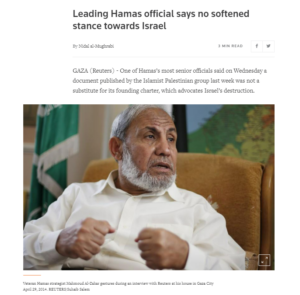In 2017, Reuters published an important interview in which senior Hamas official Mahmoud al-Zahar clarified that the terror organization’s newly released policy document did not in any way represent a retreat from Hamas’ commitment to the destruction of Israel. As Reuters’ headline succinctly put it: “Leading Hamas official says no softened stance towards Israel.”
 This week, Reuters cites that very same policy document to justify its untenable Aug. 6 claim that “Whereas Hamas leaders have made statements softening their commitment to the destruction of Israel, the smaller PIJ [Palestinian Islamic Jihad] has made no such move and rejects any compromises with Israel” (“Explainer: Palestinian Islamic Jihad, the group targeted by Israel in Gaza“).
This week, Reuters cites that very same policy document to justify its untenable Aug. 6 claim that “Whereas Hamas leaders have made statements softening their commitment to the destruction of Israel, the smaller PIJ [Palestinian Islamic Jihad] has made no such move and rejects any compromises with Israel” (“Explainer: Palestinian Islamic Jihad, the group targeted by Israel in Gaza“).
To understand exactly how much Reuters has softened its coverage of Hamas, and how little Hamas has softened its commitment to the destruction of Israel, we’ll go back to 2017. Reuters’ own 2017 interview with al-Zahar is an excellent starting point. At the time, Reuters reported:
One of Hamas’s most senior officials said on Wednesday a document published by the Islamist Palestinian group last week was not a substitute for its founding charter, which advocates Israel’s destruction.Speaking in Gaza City, Mahmoud al-Zahar, a regular critic of Israel, said the political policy document announced in Qatar on May 1 by Hamas’s outgoing chief Khaled Meshaal did not contradict its founding covenant, published in 1988.Trailed for weeks by Hamas officials, the document appeared to be an attempt to soften the group’s language towards Israel. But it still called for “the liberation of all of historical Palestine”, said armed resistance was a means to achieve that goal, and did not recognise Israel’s right to exist.“The pledge Hamas made before God was to liberate all of Palestine,” Zahar said on Wednesday. “The charter is the core of (Hamas’s) position and the mechanism of this position is the document.” . . .
In its new document, Hamas said itagrees to a transitional Palestinian state within frontiers pre-dating the 1967 Middle East war but continues to oppose recognising Israel’s right to exist and backs an armed struggle. (Emphases added.)
This [phased] strategy, dating from June 1974, has served as the PLO’s guiding principle ever since. It stipulates that the Palestinians should seize whatever territory Israel is prepared or compelled to cede to them and use it as a springboard for further territorial gains until achieving the “complete liberation of Palestine”.
Indeed, the 2017 policy affirms: “Hamas rejects any alternative to the full and complete liberation of Palestine, from the river to the sea.”
The document, which may be viewed in its entirety here, includes the following:
Palestine, which extends from the River Jordan in the east of the Mediterranean in the west, and from Ras Al-Naqurah in the north to Umm Al-Rashrash in the south, is an integral territorial unit. It is the land and the home of the Palestinian people.
Rejecting Israel’s presence in any borders, the document continues:
The establishment of “Israel” is entirely illegal and contravenes the inalienable rights of the Palestinian people and goes against their will and the will of the Ummah; it is also in violation of human rights that are guaranteed by international conventions, foremost among them is the right to self-determination.
19. There shall be no recognition of the legitimacy of the Zionist entity.
Hamas had said in a 2017 paper that it could foresee a national discussion about a Palestinian state based on the borders that were in place before the Six-Day War in 1967. But the very same paper also said there was no alternative to a fully sovereign state spanning the entirety of Palestinian territory, with Jerusalem as the capital. The latter would practically rule out coexistence with Israel.
